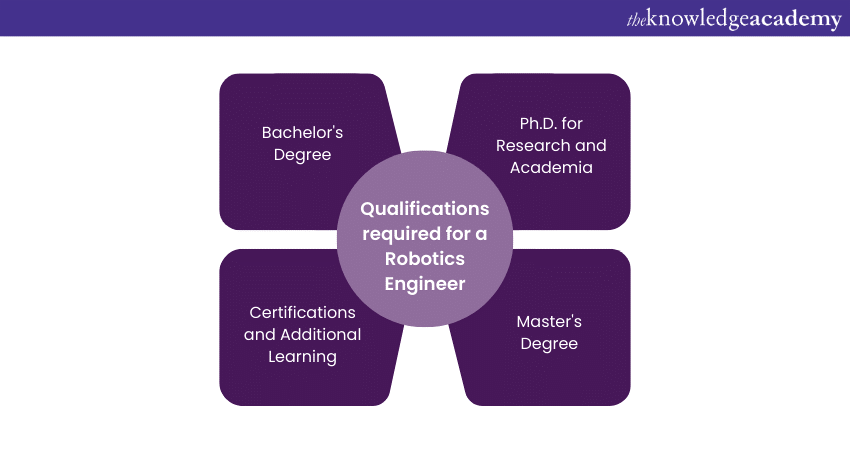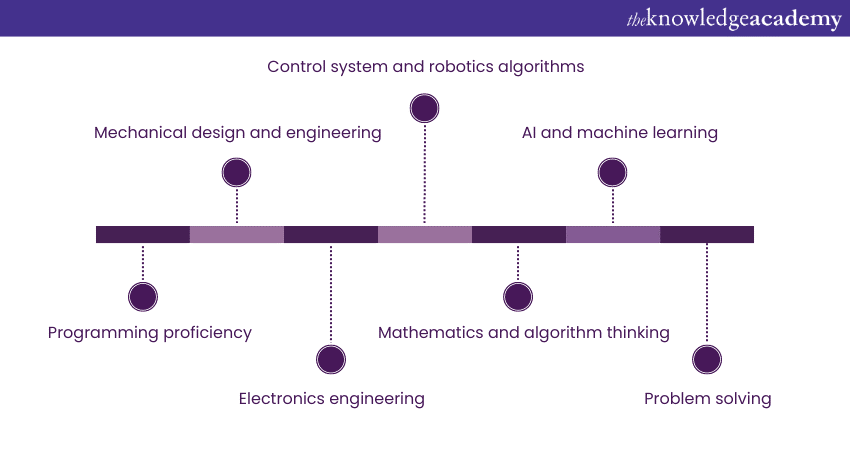We may not have the course you’re looking for. If you enquire or give us a call on 01344203999 and speak to our training experts, we may still be able to help with your training requirements.
Training Outcomes Within Your Budget!
We ensure quality, budget-alignment, and timely delivery by our expert instructors.

The mesmerising fusion of science and creativity has given birth to a field that is both awe-inspiring and transformative: Robotics. If you find yourself captivated by the notion of breathing life into machines and pioneering the forefront of innovation, then the profession of a Robotics Engineer might be a suitable path for you to tread upon.
This blog shall serve as your compass, guiding you through the skills to be honed, the educational avenues to be traversed, and the great number of opportunities that lie in wait for those who aspire to become architects of the robotic revolution. As we embark on this journey, we will look at How to Become a Robotics Engineer, including the skills, roles, and basic salary of a Robotics Engineer.
Table of Contents
1) Who is a Robotics Engineer?
2) Qualifications required for a Robotics Engineer
3) Skills required for a Robotics Engineer
a) Programming proficiency
b) Mechanical design and engineering
c) Electronics engineering
d) Control system and robotics algorithms
e) Mathematics and algorithm thinking
f) AI and Machine Learning
g) Problem-solving
4) The average salary of a Robotics Engineer
5) Conclusion
Who is a Robotics Engineer?
A Robotics Engineer is a professional who specialises in the creation and advancement of robotic technology. They work on designing, building, programming, and testing robots for various applications, ranging from manufacturing and healthcare to space exploration and consumer electronics. Robotics Engineers bridge the gap between Mechanical Engineering, Electrical Engineering, and Computer Science to create intelligent and autonomous machines.
Learn more about Robotic Devices Training today and kickstart your career!
Qualifications required for a Robotics Engineer
Becoming a Robotics Engineer requires a solid educational foundation and a combination of technical skills that span across various disciplines. Here, we'll dive into the qualifications and educational paths that are typically pursued by individuals aspiring to enter the field of Robotics Engineering.

a) Bachelor's degree: The first step of becoming a Robotics Engineer is obtaining a bachelor's degree in a relevant field. Most aspiring Robotics Engineers pursue degrees in Electrical Engineering, Mechanical Engineering, Computer Science, or a related discipline. These programs provide a strong foundation in Mathematics, Physics, and the core principles of their chosen field.
b) Master's degree: While a bachelor's degree is sufficient for some entry-level positions, a master's degree can significantly enhance career prospects and opportunities for specialisation. Pursuing a Master's in Robotics, Mechatronics, or a related field allows individuals to gain a deeper understanding of robotics concepts and engage in hands-on research projects.
c) PhD for research and academia: For those interested in leading research, developing cutting-edge technologies, or teaching at the university level, a Ph.D. in robotics or a closely related discipline is beneficial. Doctoral programs provide the opportunity to contribute to the field's advancement through in-depth research projects and scholarly contributions.
d) Certifications and additional learning: Robotics is a rapidly evolving field, so staying updated with the current technologies, tools, and methodologies is essential. Online courses, workshops, and seminars provide opportunities for continuous learning and skill enhancement. Some institutions and professional organisations offer robotics-related certifications that validate an individual's expertise in specific areas of robotics, such as robot programming, sensor integration, or control systems.
Skills required for a Robotics Engineer
The field of Robotics Engineering is a dynamic intersection of Mechanical Engineering, Electronics, Computer Science, and Artificial Intelligence (AI). To excel in this rapidly evolving domain, Robotics Engineers need a diverse skill set that enables them to conceptualise, design, build, and programme complex robotic systems. Here are the essential skills that define a successful Robotics Engineer:

Programming proficiency
Programming forms the backbone of Robotics Engineering. Proficiency in languages such as Python, C++, Java, and MATLAB is paramount. Robotics Engineers use programming to instruct robots on tasks, control their movements, and process data from sensors. Writing error-free code ensures that robots function reliably and autonomously.
For instance, imagine a Robotics Engineer working on an autonomous delivery robot. They would need to program the robot's software to navigate through different environments, avoid obstacles, and interact with customers. Proficiency in languages like Python or C++ allows them to develop algorithms that ensure the robot's safe and efficient movement.
Mechanical design and engineering
A solid understanding of Mechanical Engineering principles is essential for creating the physical structure of robots. From selecting suitable materials to designing intricate mechanisms, Robotics Engineers ensure that robots are functional, durable, and efficient. Proficiency in Computer-Aided Design (CAD) software helps in visualising and refining robot designs.
For example, a Robotics Engineer is designing a robotic arm for an industrial assembly line. They must apply Mechanical Engineering principles to create a structurally sound and precise arm that can perform repetitive tasks accurately. Using CAD software, they model the arm's components, ensuring they fit together seamlessly and can withstand the stresses of continuous operation.
Electronics engineering
Robots are a combination of hardware and software, and Robotics Engineers must be well-versed in electronics. Knowledge of circuit design, sensors, actuators, and power systems is crucial for integrating components into robotic systems. This expertise enables robots to perceive and interact with their environment effectively.
Let's take an example of healthcare robotics; a Robotics Engineer might be developing a surgical robot. This engineer must understand electronics to integrate delicate instruments, sensors, and cameras into the robot's design. With the help of wiring and programming these components, they enable the robot to perform intricate surgeries with precision, guided by the surgeon's commands.
Control system and robotics algorithms
Understanding control theory is fundamental for creating algorithms that dictate a robot's behaviour. Robotics Engineers design control systems that regulate movements, stability, and response to external stimuli. These algorithms ensure that robots execute tasks accurately and safely, whether it's a manufacturing process or a surgical procedure.
For example, a Robotics Engineer working on a self-driving car. They design control systems that regulate the car's acceleration, steering, and braking. Developing algorithms that analyse sensor data and adjust the car's actions in real-time they ensure the vehicle adheres to traffic rules, avoids collisions, and provides a safe and smooth ride.
Mathematics and algorithm thinking
Mathematics underpins many aspects of Robotics Engineering. Concepts such as linear algebra, calculus, and geometry are used to develop algorithms that govern robot actions and decision-making processes. Algorithmic thinking enables engineers to solve complex problems efficiently, enhancing a robot's capabilities.
For example, a Robotics Engineer creates a drone for agricultural purposes. They must use mathematical concepts to develop algorithms that allow the drone to identify areas needing irrigation through sensor data analysis. These algorithms help the drone determine the most efficient path for watering crops and conserving water resources.
AI and Machine Learning (ML)
The integration of AI and Machine Learning (ML) empowers robots to learn, adapt, and make intelligent decisions. Artificial Intelligence Robotics Engineers apply AI techniques to enable robots to recognise patterns, make predictions, and improve their performance over time.
For example, a Robotics Engineer is working on a robotic companion for the elderly. After incorporating AI and Machine Learning, the robot can learn the daily routines and preferences of its user. Over time, it adapts to their needs, reminding them to take medication, assisting with tasks, and providing companionship.
Problem solving
The domain of Robotics Engineering is filled with challenges and uncertainties. Strong problem-solving skills are crucial for identifying issues in robot design, programming, or functionality. Robotics Engineers creatively tackle obstacles to achieve innovative solutions.
For instance, a Robotics Engineer encounters a challenge in developing a robot for underwater exploration. They need to address issues like maintaining communication, withstanding water pressure, and navigating in harsh conditions. Their problem-solving skills led them to design a robot with waterproof seals, advanced communication technology, and adaptive propulsion systems.
The average salary of a Robotics Engineer
The potential salary you can anticipate receiving as a Robotics Engineer in the UK will vary based on factors such as your experience, skill set, and the company that employs you. However, it is reasonable to expect an annual salary falling within the range of £30,000 to £80,000.
Several factors can influence the compensation of a Robotics Engineer in the UK:
a) Experience: Remuneration often corresponds to experience. Those with a wealth of experience in Robotics Engineering generally command higher salaries. This is due to their enhanced skillset, extensive knowledge, and capacity to work with greater autonomy.
b) Skills: The specific proficiencies you possess can significantly impact your salary. For instance, Robotics Engineers skilled in areas such as Artificial Intelligence, Machine Learning, and computer vision tend to earn more than those with more generalised abilities.
c) Location: The geographical location in which you are employed can also exert influence on your salary. For instance, Robotics Engineers working in London typically earn higher remuneration compared to their counterparts in other regions of the UK.
|
Country |
Salary (Per year) |
|
United States |
$101,208 (entry-level), $165,000 (experienced) |
|
China |
¥28,000 - ¥45,000 per month (entry-level), ¥7,000,000 - ¥13,000,000 per year (experienced) |
|
Japan |
JP¥61,24,097 per year (entry-level), JP¥1,30,00,000 per year (experienced) |
|
Germany |
€50,000 - €70,000 per year (entry-level), €80,000 - €100,000 per year (experienced) |
|
India |
₹5,00,000 - ₹10,00,000 per year (entry-level), ₹12,00,000 - ₹20,00,000 per year (experienced) |
|
UK |
£30,000 - £50,000 per year (entry-level), £60,000 - £80,000 per year (experienced) |
Source: Glassdoor
Conclusion
In the world of constant technological advancement, Robotics Engineers are on the verge of creating innovative solutions that have the potential to reshape industries. Their multidisciplinary skills, coupled with a passion for cutting-edge technology, enable them to drive progress and create robots that can revolutionise the way we live and work. For those fascinated by the convergence of mechanics, electronics, and Artificial Intelligence, a career in Robotics Engineering offers a world of possibilities.
Try out our course on Robotic Process Automation Using UiPath today for a rewarding career!
Frequently Asked Questions
Upcoming IT Security & Data Protection Resources Batches & Dates
Date
 Robotic Process Automation using UiPath
Robotic Process Automation using UiPath
Thu 12th Sep 2024
Thu 7th Nov 2024
Thu 12th Dec 2024







 Top Rated Course
Top Rated Course



 If you wish to make any changes to your course, please
If you wish to make any changes to your course, please


